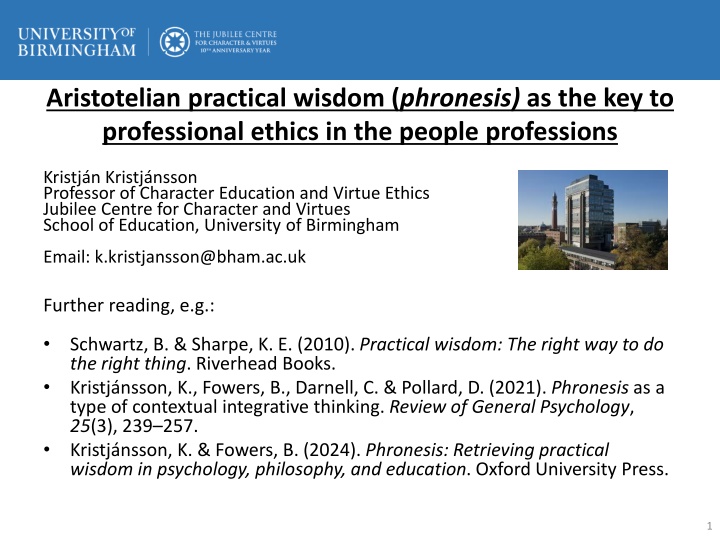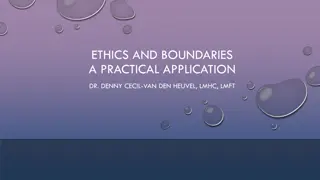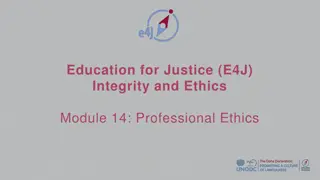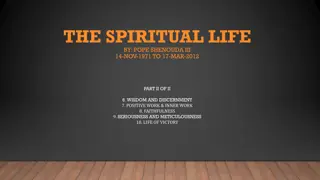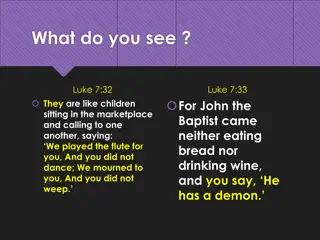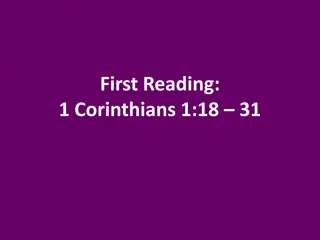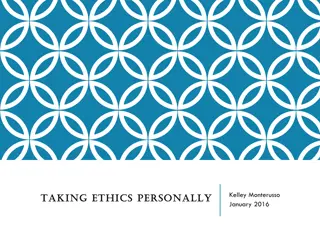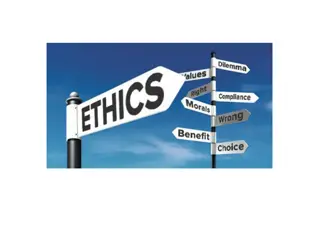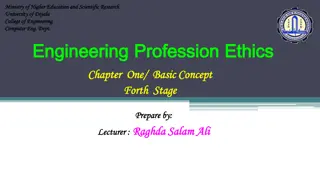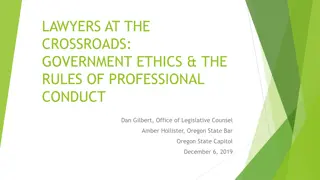Practical Wisdom in Professional Ethics: Key Insights
Aristotelian practical wisdom, known as phronesis, plays a pivotal role in professional ethics, especially in people-oriented professions. Explore research findings, challenges, and reflections on implementing practical wisdom in fields such as nursing, teaching, and more.
Download Presentation

Please find below an Image/Link to download the presentation.
The content on the website is provided AS IS for your information and personal use only. It may not be sold, licensed, or shared on other websites without obtaining consent from the author.If you encounter any issues during the download, it is possible that the publisher has removed the file from their server.
You are allowed to download the files provided on this website for personal or commercial use, subject to the condition that they are used lawfully. All files are the property of their respective owners.
The content on the website is provided AS IS for your information and personal use only. It may not be sold, licensed, or shared on other websites without obtaining consent from the author.
E N D
Presentation Transcript
Aristotelian practical wisdom (phronesis) as the key to professional ethics in the people professions Kristj n Kristj nsson Professor of Character Education and Virtue Ethics Jubilee Centre for Character and Virtues School of Education, University of Birmingham Email: k.kristjansson@bham.ac.uk Further reading, e.g.: Schwartz, B. & Sharpe, K. E. (2010). Practical wisdom: The right way to do the right thing. Riverhead Books. Kristj nsson, K., Fowers, B., Darnell, C. & Pollard, D. (2021). Phronesis as a type of contextual integrative thinking. Review of General Psychology, 25(3), 239 257. Kristj nsson, K. & Fowers, B. (2024). Phronesis: Retrieving practical wisdom in psychology, philosophy, and education. Oxford University Press. 1
Our research with students and professionals on professional ethics 2012-14: Doctors, Lawyers, Teachers 2015-17: Business, Nurses, British Army 2021-22: Police Method: 250x3 surveys, 25x3 interviews, 5 academics interviews One part of the survey: 6 dilemmas to tease out virtue ethical reasoning vs. deontological (rule-based) vs. utilitarian or self- serving 2
Plan of todays lecture 1. Findings from our empirical research with professionals 2. Introducing the Aristotelian construct of practical wisdom (phronesis) 3. Remaining problems in virtue-based professional ethics 3
A quick recap from nursing report Complaints about the lack of opportunity to hone phronesis in nursing education are getting more vocal A strange mismatch between general bioethics, where virtue ethics has become the theory of choice, and professional nursing ethics which is still, at least in U.K. nursing depts., focused almost entirely on formal rules, regulations and codes of conduct, or highly abstract deontological principles (such as respect for patient autonomy) 4
Most general finding among teachers The respondents complained that the moral middle gets squeezed out no chance to reflect upon classroom dilemmas because the emphasis is on general principles (e.g. inclusion , diversity for teachers) or very specific rules (e.g. about teachers dress codes) or formal ethical codes The respondents complained about being torn and pressured, not being able to act out their real character in classrooms The teacher educators interviewed understood character very formalistically or instrumentally Chimes in with Schwartz and Sharpe (2010) on ethical compliance secured through rules backed up by carrots and sticks...but does not work and is anti-professional!!! 5
What should professional ethics in the people professions be about? According to neo-Aristotelian virtue ethics: Development of the professional s phronesis: capacity to make excellent choices (not following rule-books!) in morally difficult situations, where 2 or more virtues seems to collide (e.g. honesty vs. loyalty to colleagues) in situations involving a) colleagues (e.g. whistleblowing scenarios), b) customers (e.g. differential treatment of patients who need special care from nurses and c) managers and admin staff (e.g. conflicting expectations) AND (this makes teacher and police ethics different from nursing ethics, medical ethics, business ethics, etc.): Also help their students develop phronesis (at least at high-school level and above) and to create conditions of the King s Peace in the public (UK) 6
Mismatch Between Professional and Personal Virtues Difference Score Virtue Judgement 1 230 Prudence 2 230 Hope 3 220 Self-regulation 4 210 Bravery 5 176 Leadership 6 152 Perspective 7 143 Social intelligence 8 135 Curiosity 9 112 Love of Learning 10 108 7
The dip across the whole sample Table 4: Mean Scores in Character Dimensions between Different Career Stages Virtue-based reasoning Training 0.62 Entry-level 0.61 Established 0.70 F ( p2) 44.50* (.01) Note. *p <.001. Deontological/ rule-based reasoning 0.63 0.65 0.63 2.71(.00) Self-serving reasoning 0.28 0.29 0.26 10.81*(.01) Cohort 1 Mean virtue-based reasoning 0.8 0.6 0.4 0.2 0 Trainee Entry-Level Stage of career (Cohort) Established
Standardised Mean Differences in Professional Purpose Across Six Professions 0.439 0.260 Police Officers Lawyers Doctors Business Nurses Teachers -0.042 -0.057 -0.075 -0.424 10
Basic question: What is most important method of professional ethics education for aspiring professionals on an Aristotelian view? Simple answer: Phronesis development Does not mean that habituation and role modelling cease to play a role But you will not radically transform a 1styear professional student s psycho-moral make-up if she has not already acquired a taste for virtues as good habits 12
What is Aristotelian phronesis? Intellectual meta-virtue which guides the moral virtues Feeding on character traits cultivated in the young through habituation, phronesis after it comes into play (when???) re-evaluates those traits critically, allowing them to share in reason Core function to assess the relative weight of competing values, courses of action and emotions with respect to eudaimonia: the ultimate good and unconditional end of human beings To adjudicate the relative weight of different virtues in conflict situations and to reach a measured verdict about what to feel and do 13
Domains of Virtue Moral Intellectual Civic Performance 14
Defining Phronesis Phronesis (4 components) Virtue Literacy Moral action 4) Blueprint Knowledge/ 1) Constitutive Ability to identify the moral problem and the perception of virtue appreciation of the good life. Reflecting moral identity 2) Adjudicative Ability to identify conflicting virtues and to reason about the right decision. 3) Emotional regulation Emotional understanding (i.e., empathy or sympathy). (Kristj nsson et al., 2021) 15
First order factor Second order factor Observed variables Observed variables Perspective taking- Interpersonal Reactivity Index Moral emotion Empathy-Interpersonal Reactivity Index Good-Self Assessment Moral identity Contingencies of self- worth Moral behaviour (pro-social) Aspects of Identity Phronesis Identification of problem Moral sensitivity Big 5 Identification of virtues Situated Wise Reasoning Moral adjudication Justifications (ICM) Actions (ICM) 16
Further complication: Collective phronesis In the Ethics Aristotle talks about phronesis solely as an intellectual virtue of an individual deliberating about dilemmas involving moral virtues. In the Politics Aristotle extends this discussion to that of phronetic rulers grappling collectively with civic virtues at the state level Given that the states Aristotle studied were city-states, most (apart from Athens and a few ) with less than 1000 citizens, those resembled more modern medium-sized companies or institutions such as hospitals and universities rather than contemporary mega-states The father of virtue-based business ethics, Bob Solomon, fittingly compared the city-states of ancient Greece to modern firms Given that most professional decisions nowadays are taken by teams of professionals, we need to cultivate collective phronesis also! 17
A model of phronesis for professional trainees Figure 1: A Neo-Aristotelian Model of Wise (Phronetic) Moral Decision-Making Example: 1. You notice a misdeed by your colleague and realise there is a conflict between loyalty and honesty. 2. You control your strong emotions. 3. You think: What is my professional moral identity? 4. You deliberate and adjudicate. 18
Questions for discussion for aspiring professionals Which virtues or values are competing here and steering the professional in different directions? What are the pros and cons of each action option? What are the different action options? Is the professional experiencing strong emotions prior to the decision? If so, what are those emotions? What should the professional do, in your view? 19
All very promising, but various PROBLEMS remain... How do we explain this fairly complicated concept to trainees? How do we justify the blueprint-component of phronesis in our pluralist liberalist climate that is sceptical of any comprehensive doctrine of the good (Aristotelian, Confucian, liberal, socialist, etc.)? How do we craft systematic interventions (professional education and CPD courses) to cultivate phronesis? How do we measure the effectiveness of those interventions beyond self- reports or short-term changes in measured behaviour? 20
Problems II... Atli Har arson (2019) wonders whether it is fair to expose aspiring professionals to the ideal of phronesis in their training if they are then prevented from using this mode of thinking when they enter the workplace because the workplace is full of rules and regulations and does not allow individual professionals to take important decisions Har arson, A. (2019). Aristotle s conception of practical wisdom and what it means for moral education in schools. Educational Philosophy and Theory, 51(14), 1518 1527. 21
Problems III: teachers as an example Recent empirical literature is full of examples, from all over the world, of how badly teachers deem themselves prepared for tackling life s biggest questions in the classroom. They complain about lack of attention to normative issues in teacher training, and about their own lack of moral language and moral identity As Chris Higgins correctly observes, restoring to its central place the flourishing of the practitioner is the first step in constructing a virtue ethics of teaching Before teachers can help students answer adequately the question of what kind of persons they want to become, in order to fulfil their potential, the teachers themselves need more extensive training in how to ask and answer such questions about themselves, both at the professional and personal levels. Same for the other people professions? Higgins, C. (2011). The good life of teaching: An ethics of professional practice. Oxford: Wiley-Blackwell. 22
Conclusion Becoming a practically wise (phronetic) professional is not easy! More difficult for teachers and police officers than for many other professions because the task is Janus-faced (see picture), both about my phronesis as a professional and helping others develop phronesis also Very difficult also because institutions are becoming more bureaucratic and rule-based and leave less space for the professionalism of the individual professional Too much paperwork, too little time for reflection and critical thinking! 23
Latest materials on virtue-based professional ethics from the Jubilee Centre Framework for Virtue-Based Professional Ethics: https://www.jubileecentre.ac.uk/?project=framework-for-virtue-based-professional-ethics Free online course on virtue-based professional ethics: https://www.jubileecentre.ac.uk/?online-course=online-cpd-professional-ethics New shorter, validated phronesis instrument (<20 min.) https://www.jubileecentre.ac.uk/wp- content/uploads/2023/12/Phronesis_DevelopingAndValidatingAShortMeasureOfPracticalWisdo m-_Final-1.pdf 24
